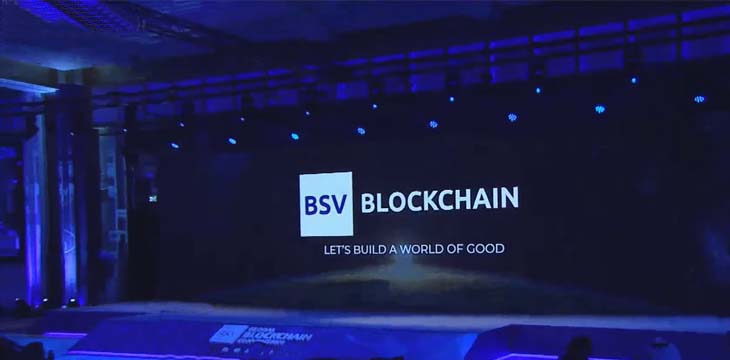|
Getting your Trinity Audio player ready...
|
At the first BSV Global Blockchain Convention, DeFiance Media got a chance to catch up with some of Bitcoin SV’s leading personalities. Each is working on something completely unique, made possible thanks to the power of the BSV blockchain.
Kurt Wuckert Jr. – CoinGeek and GorillaPool
Wuckert is well known to most in the Bitcoin SV ecosystem. He’s CoinGeek’s Chief Bitcoin Historian and co-founded GorillaPool, a mining pool focused exclusively on BSV.
Wuckert tells DeFiance how he’s been around the industry for over 10 years and has seen the real history of Bitcoin. Unlike many others, he’s not afraid to tell the true story of what happened. He maintains that Bitcoin was hijacked by a conglomerate of large companies who recognized the threat and decided to take over.
Who are these companies? Wuckert names NY Life Insurance, CME Ventures, Mastercard, AXA, and several others. He tells us how they formed an incubator to steer the direction of Bitcoin in conjunction with higher-ups from Bain Capital and the World Bank. He reminds us that this flies in the face of the ‘decentralization’ myth propagated by small blockers. Today, this powerful conglomerate dominates the industry with portfolio companies like Coinbase (NASDAQ: COIN), Kraken, Lightning Labs, BitGo, Fire Blocks, and many other prominent names.
Speaking briefly about the LUNA/UST implosion, Wuckert reminds us that there’s no such thing as a perfect algorithm and that there are far too many technocrats in the industry today. This chimes with a message he has repeated many times; that Satoshi’s original Bitcoin design should be set in stone and left alone.
Moving on to GorillaPool and his motivations for starting it, Wuckert tells us that he is a Bitcoin theorist and has always been interested in testing different things. GorillaPool allows him to experiment with specialized scripts, and so far, the pool has mined the block with the largest number of transactions and has mined 4GB+ blocks. It’s an excellent way for Wuckert to prove those who say ‘Bitcoin can’t do X’ wrong.
John ‘Jack’ Pitts – Structured Linguistics
Pitts introduces himself and his company, telling the audience they probably know of one of its products best: SLictionary. He describes it as a revolutionary communal dictionary that pays experts to define words.
Pitts highlights the flaws in the Merriam Webster and other centralized dictionaries; definitions are views, and academics in their ivory towers shouldn’t be the only ones who get to define them. SLictionary creates a “swipe left/right” economy around words, giving multiple definitions and points of view on a concept.
Pitts reminds us that language is constantly evolving and has done so through time. “The people decide the language,” he tells us. Better yet, SLictionary allows true experts to define words. For example, Satoshi Nakamoto himself can define Bitcoin, and his definition can be tokenized and sold as a security on the open market, passed down to his children, etc.
Wrapping up, Pitts tells us that SLictionary has introduced a second language: Modern Standard Arabic. He describes it as a challenge but tells us it’s now live on SLictionary.
Michal Scislowski – Soundoshi
For his part, Scislowski dreams of democratizing the music industry and introducing the next generation of music carriers with NFTs. He founded Soundoshi to achieve those goals.
Telling us more about Soundoshi, he describes how it aims to challenge the models used by big streaming services like Spotify. For him, the agreements these monopoly platforms offer are unfair, and the ‘topup and play’ model is better than the monthly subscription one. On Soundoshi, each stream will cost $0.01 or $0.02. He hopes that this model will offer listeners and artists a better deal and reinvigorate albums, which he says were basically killed off by streaming services.
Why music NFTs? Scislowski describes them as portable, transferable, and digital, the perfect vehicle for the modern world. He also tells us that Soundoshi needs micropayments to become a reality, and that’s why they ultimately built on Bitcoin SV. The blockchain’s on-chain storage was another element in their decision. As he describes it, the music files are stored on the distributed Bitcoin network and the NFTs act as access keys.
Speaking of the challenges of adopting such a model, Scislowski mentions changing people’s perceptions to make them want to own music again. He rightly points out that, right now, users could lose all of their music if a streaming service like Spotify goes out of business
In the near future, Scislowski wants Soundoshi to go to Africa, the Middle East, and South America to encourage artists there to share their music and culture with the world.
Phil Runyan – NiftyCo
Runyan is the head of a Web 3.0 incubator called NiftyCo, bringing industry expertise and knowledge to startups. He describes how users can mint NFTs on their platform and direct them to their wallets. From there, they can then pick and choose what platforms to sell them on.
Yet, NiftyCo is much more than just another NFT minting platform. Runyan describes how they are changing the game; while most NFTs today are single-serving, meaning you get an image, an audio file, or a video, NiftyCo allows users to stack multiple file types into one NFT. This greatly benefits artists, allowing them to stack album art, music files, and perhaps a music video into one file. Naturally, this can make each NFT more valuable.
Runyan tells us that his company is not exclusive to BSV but chose to build on it because of the low fees, scalability, and ease of doing so. He hopes that NiftyCo can bring access to NFTs to everyone and not just provide “crypto toys for crypto boys,” as he describes it.
Somi Arian – InPeak
Arian describes herself as a “tech philosopher” and the founder of InPeak. She started it to focus on bringing women into the Web 3.0 space. She says ‘In’ stands for inclusive, inspired, in the know, and in this together.
Before this, Arian ran a think tank for women in business and tech. It looked at why women get left behind in every new tech trend and rarely get to the top tiers in their tech careers. The think tank found that six reasons play a role:
- Confidence
- Tech skills
- Financial literacy
- Entrepreneurship skills
- Women’s health issues
- Family & relationship support
How can this be fixed? Arian’s think tank found that a multi-disciplinary approach is needed. Changing the culture, social stances towards family, and society at large will all play a role in ensuring women have equal access and opportunities in tech.
Right now, Arian is most inspired by NFTs. She finds them “incredibly empowering.” For example, she describes how they are fractionalizing communities and making it so big corporations don’t control all of the communities on their platforms.
Wrapping up the interview, Arian describes how she not only wants to see women empowered in tech, but she feels it’s important that they play a role in how new technology forms. Right now, she sees technology as dominated by male thinkers, and she believes that this is dangerous.
Latif Ladid – Founder and President of the IPv6 Forum
Latif Ladid is likely well known to BSV enthusiasts already. He’s a researcher at the University of Luxembourg, is the Founder and President of the IPv6 Forum, and is chair and co-chair of several other subcommittees surrounding 5G, IPv6, and the internet.
Ladid tells DeFiance Media that the current internet runs on IPv4, which only has around 4.3 billion addresses, and that we consumed all of them in 2011. He elaborates on how IPv6 is in the process of replacing IPv4, making 340 trillion addresses available.
Ladid describes the current internet as a “research internet” and says we must move to a “production internet.” When we do, each person will have multiple IP addresses. Devices will have unique IP addresses, too.
This will bring about a world of end-to-end communication and direct connectivity between everything and everyone.
While researching blockchain and IPv6 for the European Commission, Ladid details how he encountered some papers published by Dr. Craig Wright, he describes how he emailed him, and the two have been traveling and promoting the idea that Bitcoin and IPv6 were made for each other ever since.
Watch the BSV Global Blockchain Convention Dubai 2022 Day 1 here:
https://www.youtube.com/watch?v=ggbZ8YedpBE
Watch the BSV Global Blockchain Convention Dubai 2022 Day 2 here:
https://www.youtube.com/watch?v=RzJsCRb6zt8
Watch the BSV Global Blockchain Convention Dubai 2022 Day 3 here:
https://www.youtube.com/watch?v=RzSCrXf1Ywc

 02-19-2026
02-19-2026 




